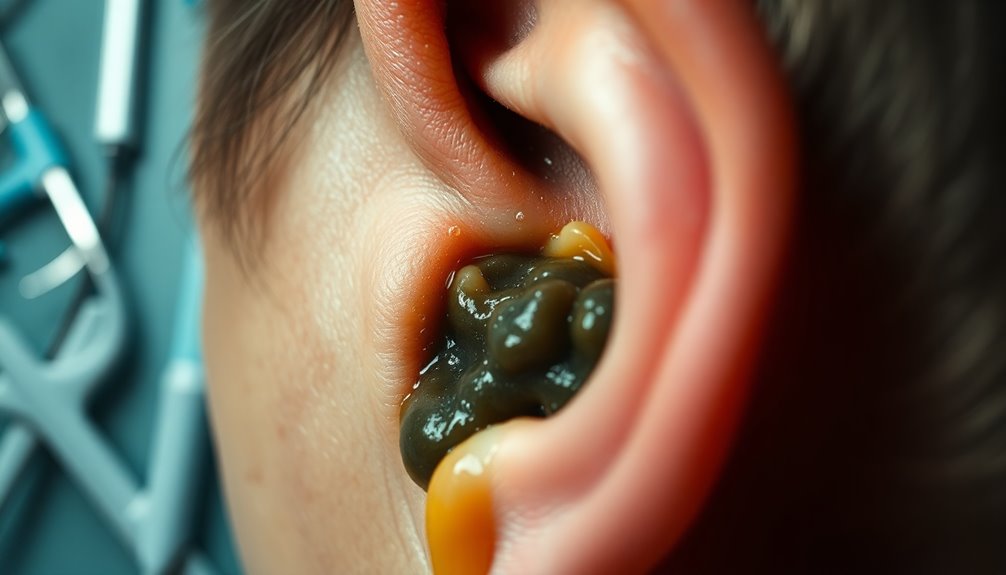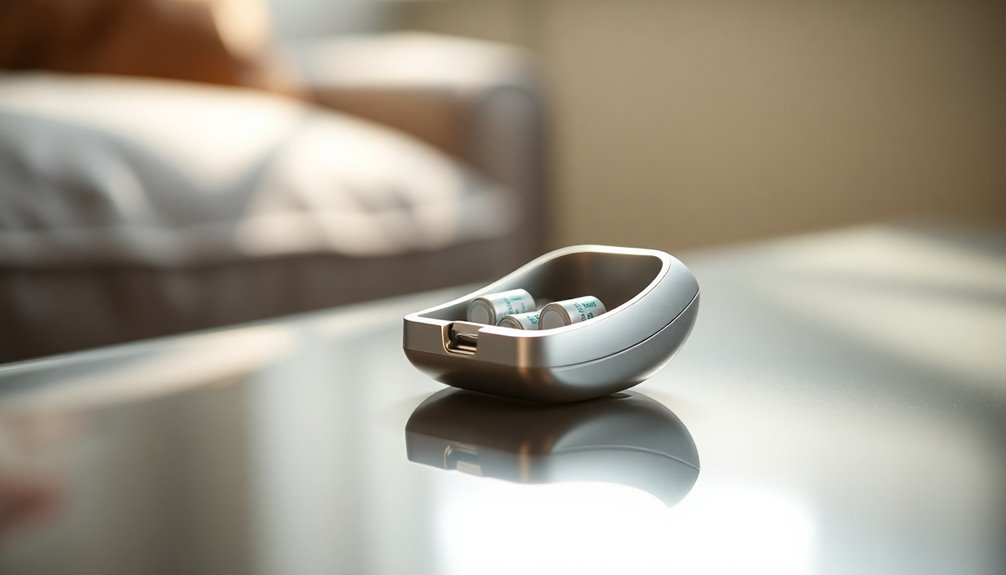If you notice foul-smelling earwax, don't ignore it! This odor often points to an infection caused by bacteria in trapped earwax. You might also experience discomfort, difficulty hearing, or itchiness. Blocked earwax can create a breeding ground for these bacteria, leading to worse problems. It's crucial to get a proper diagnosis from a healthcare provider, who can examine your ears and suggest the right treatment. You might need professional cleaning or simple remedies for relief. Maintaining regular ear hygiene can prevent future issues. For more insights on causes and treatments, keep exploring.
Key Takeaways
- Foul-smelling earwax may indicate an underlying infection caused by bacteria or trapped moisture in the ear canal.
- Discomfort, pain, or hearing difficulties often accompany foul-smelling earwax, signaling the need for medical evaluation.
- Diagnosis involves a physical examination and may include cultures to identify infections or assess earwax buildup.
- Treatment options include over-the-counter ear drops, home remedies, and professional cleaning if symptoms persist.
- Regular hygiene practices and avoiding ear canal obstructions can help prevent foul-smelling earwax and maintain ear health.
Causes of Foul Smelling Ear Wax

Experiencing foul smelling earwax can be alarming, and it often points to underlying issues. A foul odor coming from your earwax typically indicates an infection, as bacteria thrive in accumulated earwax.
If you have blocked earwax, it can trap moisture in the ear canal, creating a perfect breeding ground for these odor-causing bacteria.
Skin irritations, like eczema, can also alter the composition of your earwax, leading to unpleasant smells. If you've got foreign objects in your ear, they can irritate the canal and potentially cause infections, which may result in that strong, unpleasant odor.
Don't overlook how hormonal changes can play a role in your ear health, too. During puberty or other significant hormonal shifts, you might notice variations in earwax production and its odor.
Staying alert to these changes can help you address any underlying concerns before they escalate. If you notice a persistent foul odor, it's vital to consult a healthcare professional to guarantee your ear canal remains healthy and free from infection.
Symptoms to Watch For
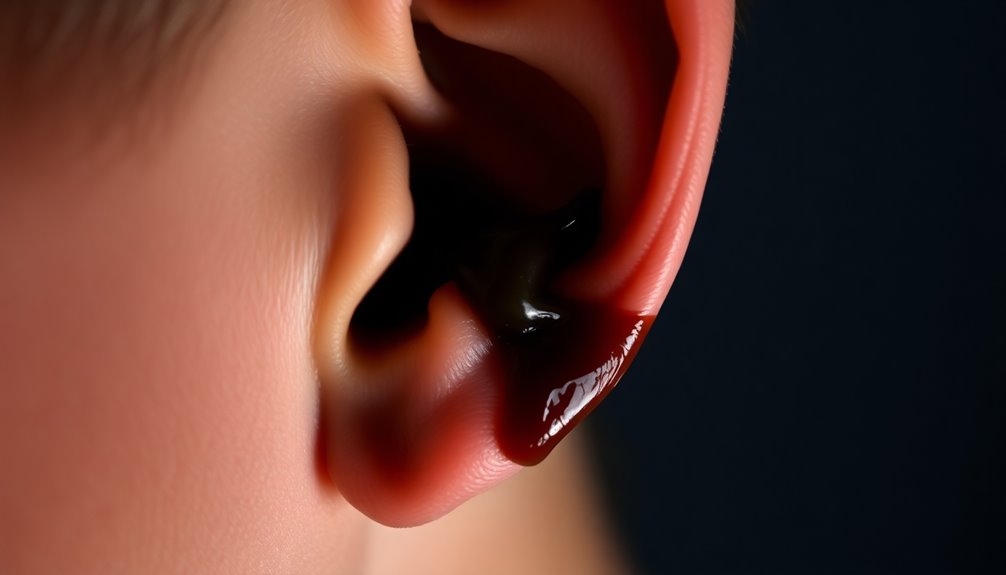
When foul-smelling earwax is present, it's vital to pay attention to accompanying symptoms that may signal an underlying issue. Ignoring these signs can lead to more serious problems, including an ear infection.
Here are some symptoms to watch for:
- Discomfort or pain in the ear
- Difficulty hearing or a sense of fullness
- Itchiness or dizziness
If you're experiencing any of these symptoms alongside foul-smelling earwax, it's time to seek medical evaluation. Persistent odor, especially when combined with discomfort, can indicate an ear infection and shouldn't be overlooked.
Children may also exhibit signs of trouble, like tugging at their ears or increased irritability.
Moreover, if you notice blood or any discharge not related to earwax, you need immediate medical attention. These symptoms can escalate quickly, leading to complications if left untreated.
Trust your instincts—your body often knows when something's wrong. Stay vigilant and don't hesitate to consult a healthcare professional if you experience these alarming signs.
Addressing foul-smelling earwax and its symptoms early is vital for maintaining good ear health.
Diagnosis Methods
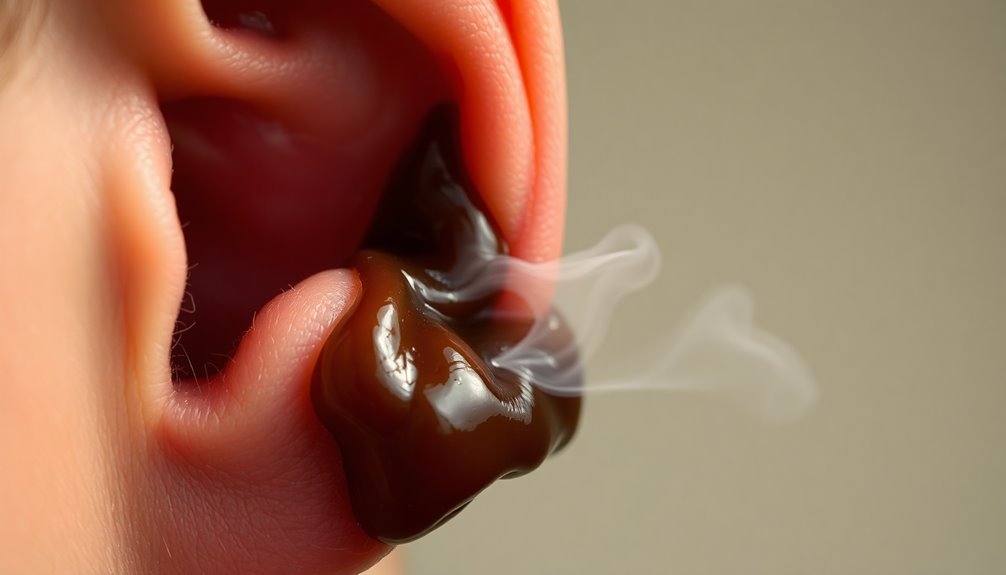
How can you determine if foul-smelling earwax signals a more serious issue? The diagnosis typically begins with a physical examination by healthcare providers who use an otoscope to visualize earwax buildup and check for any signs of infection in your ear canal.
If an infection is suspected, cultures may be taken from ear discharge to identify specific bacteria responsible for the odor.
Your patient history plays an essential role, too. Healthcare providers will ask about your hygiene practices and any accompanying symptoms you may have, which helps them gauge the severity of the situation.
If you're experiencing hearing loss or blockage, audiological assessments might be necessary to evaluate the impact of the smelly earwax on your hearing capabilities.
Additionally, further tests could be performed to rule out other conditions, such as foreign objects or skin issues in your ear, which might contribute to the unpleasant odor and symptoms you're experiencing.
Treatment Options Available
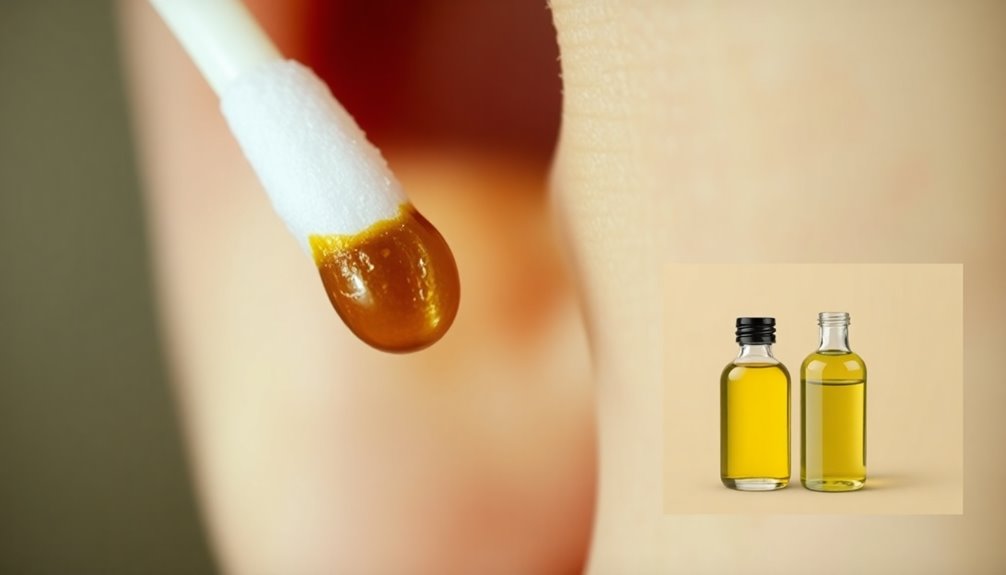
If foul-smelling earwax is diagnosed, addressing the underlying cause becomes important for effective treatment. You have several treatment options available that can help remove earwax and restore ear hygiene. Depending on the situation, you might try:
- Over-the-counter ear drops to soften the wax
- Home remedies like warm olive oil to facilitate removal
- Professional ear cleaning if symptoms persist
Consulting a healthcare provider is vital, especially if your smelly earwax is accompanied by pain, hearing loss, or discharge. These symptoms could indicate a more serious underlying issue.
If needed, your provider may recommend ear irrigation or manual removal with specialized tools to guarantee safe extraction.
While home remedies can be effective, use them with caution to avoid complications. Regular ear hygiene practices can prevent the buildup of smelly earwax, making it essential to maintain cleanliness.
If you notice recurrent issues, don't hesitate to seek professional advice. By addressing the underlying causes and choosing the right treatment options, you can effectively manage and eliminate foul-smelling earwax.
Prevention Techniques
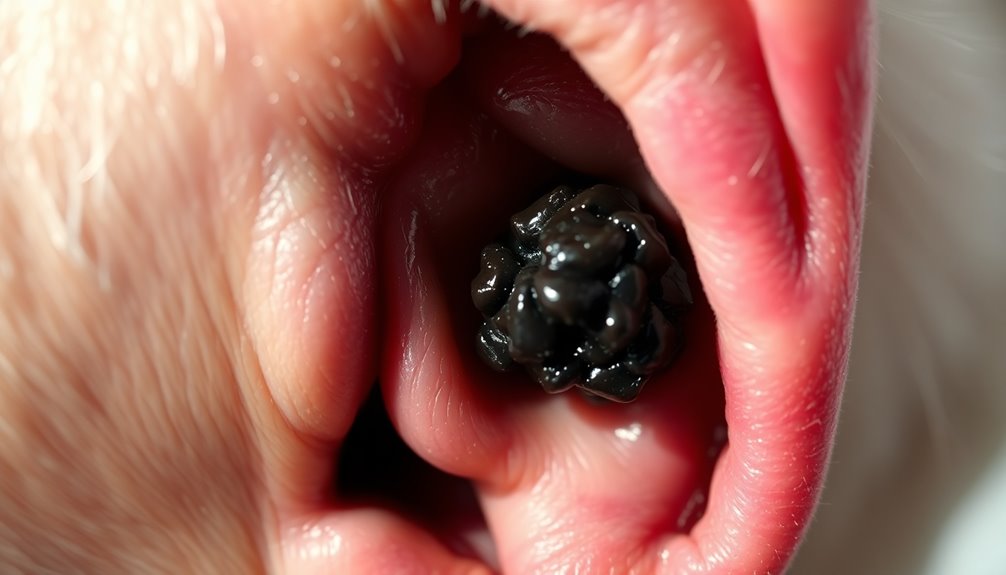
To keep foul-smelling earwax at bay, maintaining regular ear hygiene is essential. Start by gently cleaning your outer ear with a damp cloth. This simple practice helps prevent excessive earwax buildup and unpleasant odors.
Staying hydrated is equally important; it promotes healthy earwax consistency, reducing the chances of dry or hard wax that can lead to blockages and foul smells.
Another key preventive technique is to avoid inserting objects into your ear canal, like cotton swabs. Doing so can push wax deeper, causing potential blockages and ear infections.
Additionally, be mindful of your diet. Limiting the consumption of odor-inducing foods, such as garlic and spicy dishes, can help manage the smell of earwax if you're prone to foul odors.
Finally, scheduling regular check-ups with a healthcare professional can assist in monitoring your ear health. These visits are vital for effective earwax removal and addressing any buildup issues before they escalate.
Frequently Asked Questions
What Does It Mean When Your Earwax Smells Bad?
When your earwax smells bad, it usually signals an underlying issue.
You might be dealing with an infection or a blockage caused by bacteria and debris. Trapped moisture or foreign objects can worsen the odor.
Skin conditions like eczema can also change the composition of your earwax, leading to unpleasant smells.
If you notice this change alongside symptoms like ear pain or drainage, it's best to consult a healthcare provider for evaluation.
What Dissolves Ear Wax the Fastest?
Ever wondered what dissolves earwax the fastest? Over-the-counter cerumenolytic solutions like saline or hydrogen peroxide work effectively by softening the wax, making it easier to remove.
You can also try warm olive oil, which lubricates and dissolves blockages.
For a more targeted approach, ear drops containing carbamide peroxide can break down earwax quickly.
If you need immediate relief, professional ear irrigation by a healthcare provider can flush out softened wax efficiently.
What Happens if Earwax Goes Too Deep?
If earwax goes too deep, it can lead to cerumen impaction, causing discomfort like earaches, hearing loss, or tinnitus.
You might notice that sounds become muffled, and you could even feel dizzy.
The moisture trapped by the blockage creates a breeding ground for bacteria, increasing the risk of infections.
Regular cleaning and assessments are key to preventing deep buildup, so don't hesitate to consult a healthcare professional if you suspect an issue.
How Do You Treat Bad Smelly Ears?
Imagine you've just come home after a long day, and you notice a foul smell coming from your ears.
Treating bad-smelling ears starts with a thorough exam by a healthcare provider, who'll check for infections. You might use over-the-counter ear drops to soften wax, or if needed, get prescription medication.
If the odor persists, a professional cleaning can help clear any blockages. Regular ear hygiene will keep your ears healthy and odor-free.
Conclusion
In summary, don't ignore foul-smelling ear wax; it might signal an underlying issue. Stay alert for symptoms, seek a proper diagnosis, and explore treatment options. Maintain good ear hygiene, avoid irritants, and regularly check your ear health. By being proactive, you can safeguard your well-being and guarantee your ears stay clean and odor-free. Remember, a little attention today can prevent bigger problems tomorrow, so take action and keep your ears in top shape!
